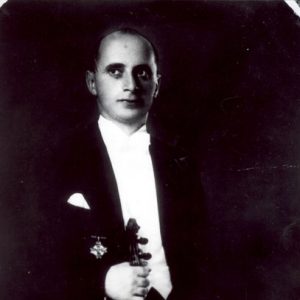Dalia Hofmekler-Ginzburg
Dalia Ginzburg, née Hofmekler, was born in Kovno, when Lithuania was still free. She says: "My father was a well-known musician in Lithuania, Michael Hofmekler, a violinist and conductor. My grandfather played the cello and contrabass. Before the war, one of his brothers went to Israel, then to the United States, and thus survived. My mother came to Kovno from a small town called Sarai. In the summer of 1941, the Germans invaded Lithuania, the Baltic States and the USSR, and then the Lithuanians, having received freehand, began the killings and murders, venting their anger on Russians and Jews. My mother's family - my relatives who remained in the town - perished. My father, his parents, my mother and I, entered the infamous Kovno Ghetto. We remained in the ghetto till its liquidation.”
“My father survived thanks to his musical skills. My father and grandfather formed an orchestra together with other musicians and played for the Germans. This was during the 'quiet' period of the ghetto. After the Aktions, the killing of academics and intellectuals, a short period of calm followed. When they decided to liquidate the ghetto, who did they murder? They killed little children who could not work and old people who could not contribute. When it became known that there was to be an Aktion against children and the elderly, my mother decided to do anything she could to save me. She obtained the address and telephone number of a woman named Mania, our cousins’ housekeeper. She was the one who should have saved my cousin, but luckily, my cousin was taken by their family friend and thus Mania was free to take me. I remember the separation to this day. A five and a half year old girl’s separation from her mother leaves a lifelong trauma. This was not the last parting. She dressed me up and prepared me to go with Aunt Mania who would take me to her village since Kovno was too dangerous. A German officer named Berter, who rescued some children from the ghetto, hid me in a small kitchen cupboard with top drawers that he opened so I could have some air, and loaded the cupboard on a cart pulled by a mare. The ghetto was liquidated.”
“My grandfather was sent to Auschwitz, my grandmother was killed in the ghetto, my father was sent to Dachau, and my mother was sent with the rest of the women to a camp on the Polish-German border. Father again survived because of his music. Mom endured because she knew she had to survive to get back to me. She became ill with typhus and fell, during the death journeys, on a pile of dead in the snow. She was rescued by a Russian soldier passing by who saw a hand moving through the pile of bodies. He brought her to a Russian army field house where she stayed for six months until she recovered. Father was rescued by the Americans who took good care of him, and he arrived to Israel in '48. The situation did not terminate with the end of the war. I stayed with my rescuers until Kovno was freed, and it was decided to set up an orphanage for children who had survived the killings. Of 1,500 children, less than 200 survived. When my mother came looking for me there, she did not find me because the night before my father sent people from the escape organization to pick me up.
They took me to Vilna, since there was a group of Jews there who wanted to cross the border from Lithuania to Poland then on to Germany to reunite with families. My mother quickly went to Vilna and found me. She went to pick up my cousin because her mother perished and her father was with my father. All three of us waited for the transport. We drove out on trucks; someone tipped-off our plan, and we were caught. They put us in an abandoned children's institution, and from there Katia and I - my cousin five years older than I - fled because we heard we were being transferred to Central Asia. We reached my relatives who took me to a Jewish orphanage. My mother was sent to the Urals as a political prisoner. She received an eight-year sentence, but friends of my father managed to lower the prison term to two years. After two years, she returned to Lithuania and found me. In ‘52 the regime removed this “mark of disgrace” from her. I was thirteen when she took me, and we had four good years together. In '56 my father started sending requests for us to leave. We received permission to make aliyah and arrived to Tel Aviv. My parents did not reunite and did not live together because he already had someone else.


